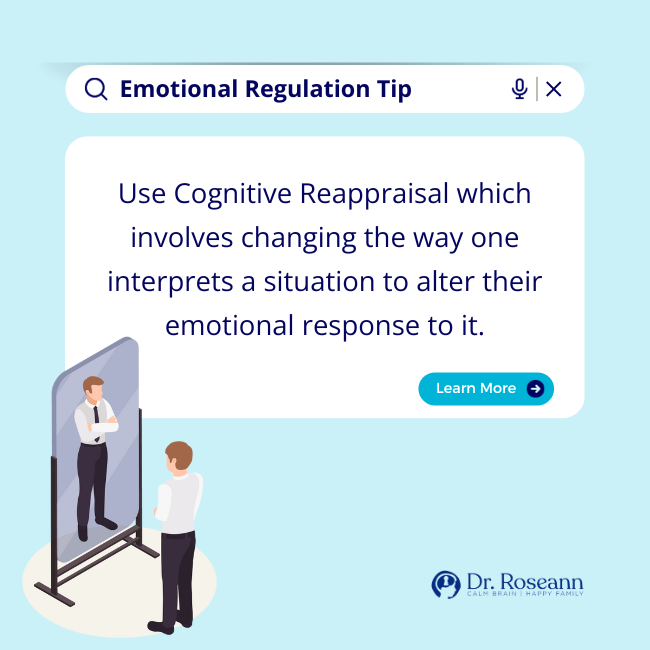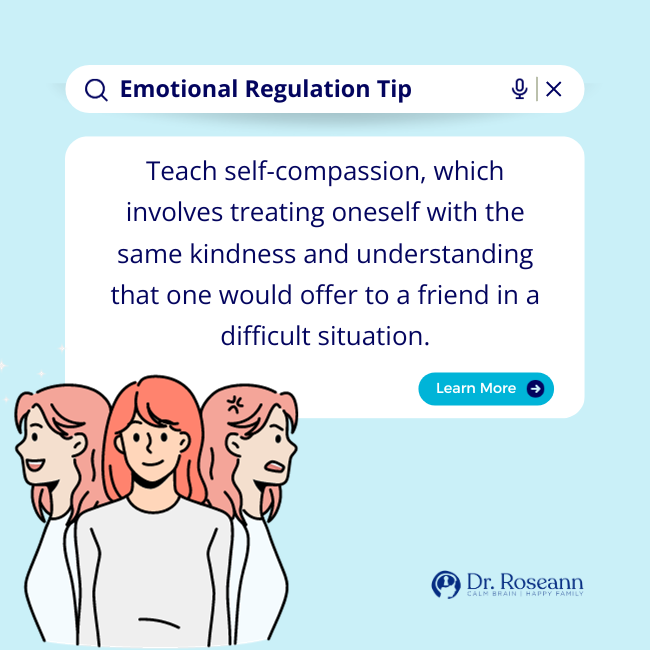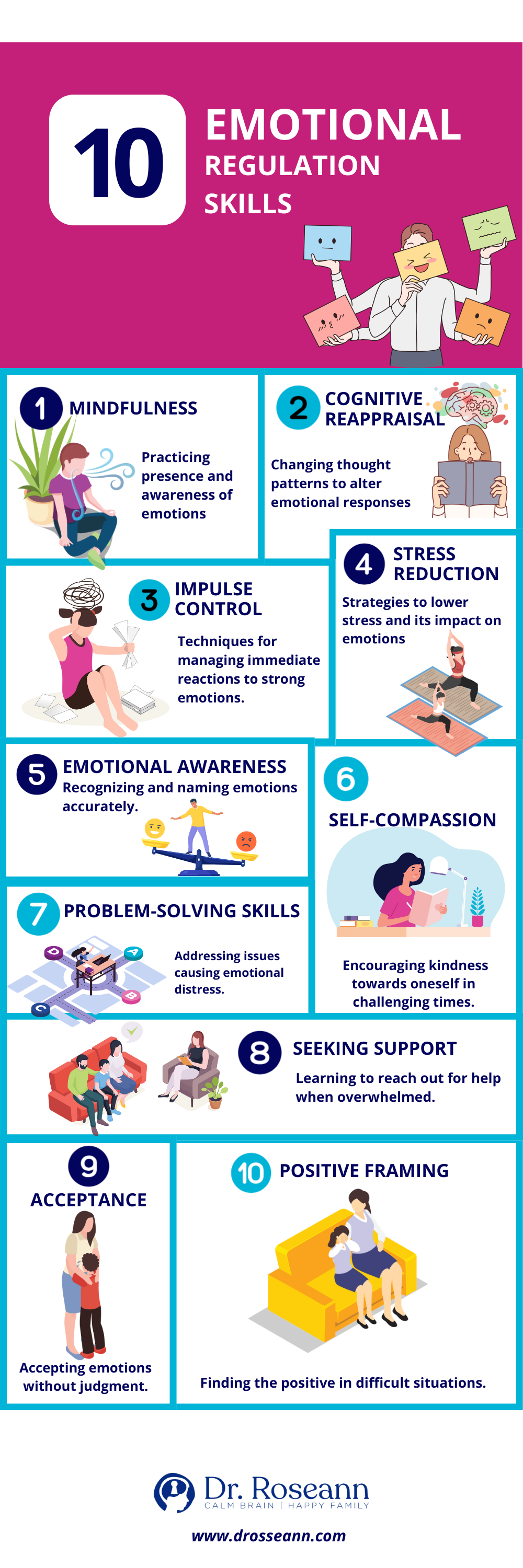As a parent, facing the daily challenges that come with raising a child who struggles with emotional dysregulation can be deeply trying. Your days may be punctuated by intense emotional reactions, difficult behaviors, and stressful situations that test your patience and resilience. The impact on family dynamics and personal well-being can be significant, often leaving you feeling drained, concerned, and searching for answers.
Understanding and supporting your child through these tumultuous emotional landscapes is not just a responsibility but a profound journey of love and commitment. This path, while challenging, is also filled with opportunities for growth, learning, and deepening the bonds of understanding and empathy within your family.
What is Emotional Regulation?
Emotional regulation is the process of managing one's emotional reactions in various situations. It involves understanding and controlling emotions, which is particularly crucial in managing negative emotions and stressful situations. Those who struggle with dysregulation are lacking in these skills.
For a child or teen, emotional regulation is about learning how to respond to their feelings in a healthy way, rather than being overwhelmed by them. This skill is vital for mental health and overall well-being, enabling individuals to navigate life's challenges with resilience and adaptability.
What Does Science Say About Emotional Regulation?
Research in the field of psychology underscores the significance of emotional regulation in maintaining mental health. A meta-analysis examining the relationship between emotion regulation strategies, such as cognitive reappraisal and expressive suppression, and mental health outcomes (life-satisfaction, positive affect, depression, anxiety, and negative affect) found significant correlations.
Cognitive reappraisal was positively correlated with indicators of good mental health and negatively with negative indicators of mental health, while expressive suppression showed opposite trends (Hu, Zhang, Wang, Mistry, & Ran, 2014). These findings highlight the impact of specific emotional regulation strategies on mental well-being.
Furthermore, at least 8% to 10% of children younger than 5 years experience clinically significant and impairing mental health problems, which include emotional, behavioral, and social relationship issues. These early challenges can have long-term adverse consequences, emphasizing the importance of addressing emotional and behavioral problems early in life (American Academy of Pediatrics, 2021).
Another study on young adolescents found that the ability to effectively manage emotions is crucial for healthy psychological and social development. This research explored the relationship between emotion regulation strategies (reappraisal and suppression) and social outcomes, controlling for mental health variables like anxiety and depression. The findings suggest that the use of emotion regulation strategies, mental health, and social outcomes are all interrelated in adolescent well-being (Chervonsky & Hunt, 2019).
These studies collectively indicate that developing effective emotional regulation strategies in childhood and adolescence can lay a strong foundation for emotional intelligence later in life. Scientific findings also suggest that emotional regulation can be improved through practice, making it a crucial skill set for managing thoughts and feelings, especially in difficult emotions and stressful situations.
How to Control Your Emotions?
Controlling emotions, particularly in challenging or triggering situations, is an essential skill for both children and adults. It's about recognizing and managing your emotional response in a way that is healthy and constructive. Techniques such as cognitive reappraisal, where you change your perspective on a situation, and practicing mindfulness, which involves staying present and aware, can be incredibly effective.
Teaching children these techniques helps them learn how to control their emotions, thus empowering them to handle unpleasant emotions and strong emotions in a more balanced way.
How Emotional Regulation Skills Can Improve Mental Health
Emotional regulation skills play a pivotal role in enhancing mental health. By learning how to manage emotions effectively, children and teens can reduce the intensity and frequency of negative emotions and emotional reactions. This skill set is especially crucial for those with behavioral and mental health issues, as it provides them with tools to navigate emotional intensity, reduce negative thoughts, and handle difficult emotions. When children learn to regulate their emotions effectively, they are better equipped to face life's challenges, leading to improved mental health and emotional well-being.
Incorporating these sections into your blog post will provide a comprehensive understanding of emotional regulation, its scientific basis, techniques to control emotions, and its impact on mental health.
10 Emotional Regulation Skills
1. Mindfulness: Practicing presence and awareness of emotions.
Mindfulness involves being fully present in the moment and aware of your thoughts, feelings, and surroundings without judgment. For children and teens, practicing mindfulness means acknowledging their emotions as they arise and observing them without criticism.
This practice helps in recognizing emotional patterns and triggers, leading to a better understanding of how to manage emotional responses. Mindfulness can be cultivated through simple activities like deep breathing, mindful walking, or body scans, helping young individuals center themselves during moments of emotional intensity.
2. Cognitive Reappraisal: Changing thought patterns to alter emotional responses.
Cognitive reappraisal is a powerful emotional regulation technique that involves changing the way one interprets a situation to alter their emotional response to it.

This skill can be particularly useful in dealing with negative emotions or negative thoughts.
By teaching children to reframe their thoughts about challenging situations, they learn to view these experiences in a more positive or neutral light, reducing the emotional impact and helping them maintain a more balanced emotional state. Building metacognitive skills supports future mental health too.
3. Impulse Control: Techniques for managing immediate reactions to strong emotions.
Impulse control is crucial in managing strong emotional responses and preventing reactive behaviors. It involves recognizing the urge to act on a strong emotion and choosing to pause and think before responding. Strategies such as counting to ten, taking deep breaths, or using a stress ball can be effective for children and teens.
These techniques allow time for the initial wave of emotion to pass, enabling more thoughtful and less reactive decision-making.
4. Stress Reduction: Strategies to lower stress and its impact on emotions.
Stress reduction techniques are essential in emotional regulation, as stress often exacerbates emotional responses. Children and teens can benefit from activities like exercise, engaging in hobbies, or relaxation exercises.
Teaching them stress management skills like time management, organization, and relaxation techniques not only helps in reducing their stress levels but also diminishes the intensity of their emotional reactions in stressful situations.
5. Emotional Awareness: Recognizing and naming emotions accurately.
Emotional awareness is the ability to recognize and identify one's emotions. This skill is foundational in emotional regulation, as it is difficult to manage an emotion that is not fully understood or acknowledged.
Parents can help their children develop this skill by encouraging them to express their feelings and helping them put names to those emotions. This process enhances their ability to recognize and deal with their emotions effectively.
6. Self-Compassion: Encouraging kindness towards oneself in challenging times.
Self-compassion involves treating oneself with the same kindness and understanding that one would offer to a friend in a difficult situation.

It is especially important in managing feelings of guilt or inadequacy, as they can lead to emotional upset and sensitivity.
Teaching children self-compassion helps them to be more forgiving of their mistakes and to view challenging experiences as opportunities for growth rather than failures.
7. Problem-Solving Skills: Addressing issues causing emotional distress.
Problem-solving skills help children and teens identify and address the root causes of their emotional distress. This skill involves recognizing the problem, brainstorming potential solutions, evaluating these solutions, and then implementing them.
Developing problem-solving skills empowers young individuals to take control of the situations that cause them emotional distress, thereby reducing their impact. These skills help them manage upset and use critical thinking skills to deal with whatever life throws at them.
8. Seeking Support: Learning to reach out for help when overwhelmed.
Teaching children to recognize when they need help and how to seek support is a vital aspect of emotional regulation. This could mean talking to a parent, teacher, or mental health professional. Cuing a child to use coping skills and confront their worries or stressors is key in building emotional regulation skills.
Encouraging children to reach out when they are overwhelmed can help prevent negative emotions from escalating and provide them with the tools and resources they need to cope.
9. Acceptance: Accepting emotions without judgment.
Acceptance involves acknowledging emotions as they are, without trying to change or judge them. This doesn’t mean resigning oneself to negative feelings but rather recognizing that emotions are a natural response to certain situations.
Teaching children to accept their emotions can reduce the struggle against them and pave the way for healthier coping strategies.
10. Positive Reframing: Finding the positive in difficult situations.
Positive reframing is about shifting the focus from the negatives of a situation to any potential positives or opportunities for growth. This skill helps in reducing the impact of negative thoughts and emotions. It encourages a more optimistic outlook, which can be particularly beneficial in managing difficult emotions and enhancing overall emotional well-being.
Emotional Regulation Skills in Children and Adults
The journey of nurturing emotional regulation in deeply feeling kids is both challenging and rewarding. For parents who are on the search for non-medication alternatives, knowing how to manage these behaviors is a step in the right direction.
Ten essential self-regulation skills have been highlighted as key tools in helping individuals manage emotional upset and develop resilience. These skills, including mindfulness, cognitive reappraisal, and impulse control, are vital in teaching young individuals how to navigate their intense emotional experiences and are the foundation of self regulation and brain calming.
Stress reduction techniques and emotional awareness play a crucial role in recognizing and understanding emotions, while self-compassion offers a nurturing approach during difficult times.
Problem-solving skills empower children to address emotional distress at its source, and the importance of seeking support cannot be overstated. Acceptance of emotions without judgment and the practice of positive reframing help in transforming negative thoughts and feelings into opportunities for growth.
Gaining these self-regulation skills equips deeply feeling kids with the ability to better understand, manage, and learn from their emotional experiences, paving the way for a healthier, more emotionally intelligent future.
If you are ready to create change for yourself at work or for your child at school or home, then our BrainBehaviorReset™ Program is your next step.
Citations
American Academy of Pediatrics. (2021). Addressing Early Childhood Emotional and Behavioral Problems. Pediatrics.
Chervonsky, E., & Hunt, C. (2019). Emotion regulation, mental health, and social wellbeing in a young adolescent sample: A concurrent and longitudinal investigation. Emotion, 19(2), 270-282. https://pubmed.ncbi.nlm.nih.gov/29697988/
Dr. Roseann Capanna-Hodge was the featured expert in this Healthline article: Healthline. (2019.). Self-regulation skills. Retrieved from https://www.healthline.com/health/childrens-health/self-regulation-skills
Are you looking for SOLUTIONS for your struggling child or teen?
Dr. Roseann and her team are all about science-backed solutions, so you are in the right place!
Grab your complimentary copy of
147 Therapist-Endorsed Self-Regulation Strategies for Children: A Practical Guide for Parents
You can get her books for parents and professionals, including: It’s Gonna Be OK™: Proven Ways to Improve Your Child’s Mental Health, Teletherapy Toolkit™ and Brain Under Attack: A Resource For Parents and Caregivers of Children With PANS, PANDAS, and Autoimmune Encephalopathy.
If you are a business or organization that needs proactive guidance to support employee mental health or an organization looking for a brand representative, check out Dr. Roseann’s professional speaking page to see how we can work together.
Dr. Roseann is a Children’s Mental Health Expert and Licensed Therapist who has been featured in/on hundreds of media outlets including The Mel Robbins Show, CBS, NBC, PIX11 NYC, Today, FORBES, CNN, The New York Times, The Washington Post, Business Insider, Women’s Day, Healthline, CNET, Parade Magazine and PARENTS. FORBES called her, “A thought leader in children’s mental health.”

She coined the terms, “Re-entry panic syndrome” and “eco-anxiety” and is a frequent contributor to media on mental health.
Dr. Roseann Capanna-Hodge has three decades of experience in working with children, teens and their families with attention-deficit hyperactivity disorder (ADHD), autism, concussion, dyslexia and learning disability, anxiety, Obsessive Compulsive Disorder (OCD), depression and mood disorder, Lyme Disease, and PANS/PANDAS using science-backed natural mental health solutions such as supplements, magnesium, nutrition, QEEG Brain maps, neurofeedback, PEMF, psychotherapy and other non-medication approaches.
She is the author of three bestselling books, It’s Gonna Be OK!: Proven Ways to Improve Your Child's Mental Health, The Teletherapy Toolkit, and Brain Under Attack. Dr. Roseann is known for offering a message of hope through science-endorsed methods that promote a calm brain.
Her trademarked BrainBehaviorResetⓇ Program and It’s Gonna be OK!Ⓡ Podcast has been a cornerstone for thousands of parents facing mental health, behavioral or neurodevelopmental challenges.
She is the founder and director of The Global Institute of Children’s Mental Health, Neurotastic™Brain Formulas and Dr. Roseann Capanna-Hodge, LLC. Dr. Roseann is a Board Certified Neurofeedback (BCN) Practitioner, a Board Member of the Northeast Region Biofeedback Society (NRBS), Certified Integrative Mental Health Professional (CIMHP) and an Amen Clinic Certified Brain Health Coach. She is also a member of The International Lyme Disease and Associated Disease Society (ILADS), The American Psychological Association (APA), Anxiety and Depression Association of America (ADAA) National Association of School Psychologists (NASP), International OCD Foundation (IOCDF).
© Roseann-Capanna-Hodge, LLC 2023











